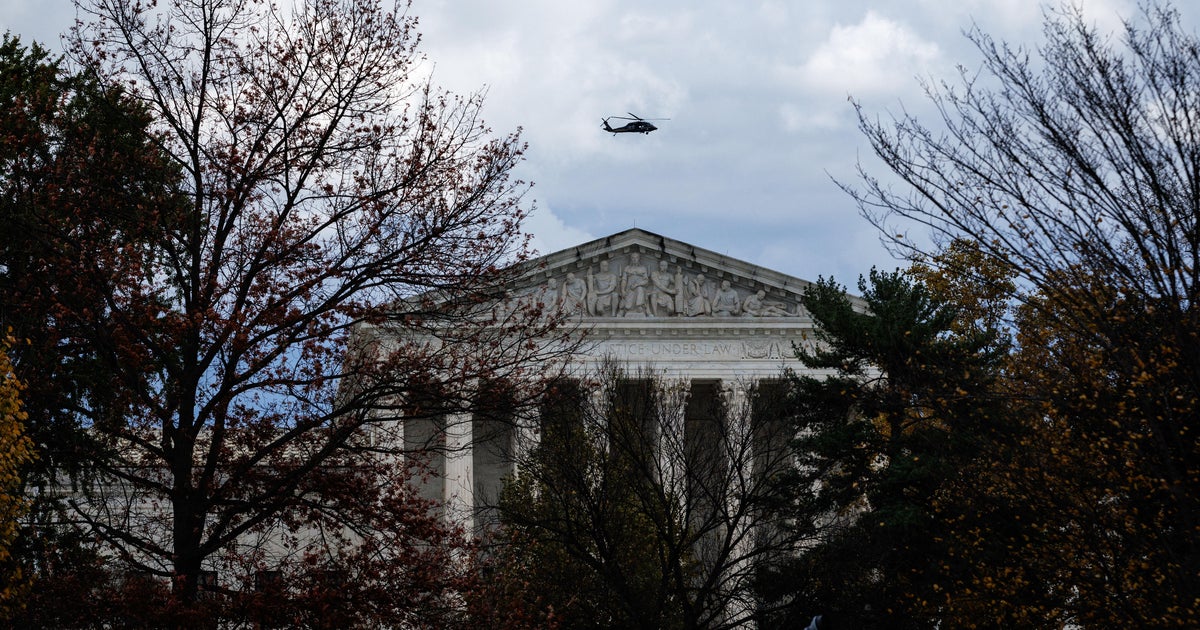Texas calls on Supreme Court to keep abortion ban in place
Washington — Texas state officials on Thursday encouraged the Supreme Court to leave untouched a state law that bans most abortions after about six weeks of pregnancy, arguing the justices should reject a request from the Biden administration to block enforcement of the measure.
In a filing with the Supreme Court, Texas Attorney General Ken Paxton and other top officials said the Justice Department does not have a legal right to sue the state in federal court because it has not been injured by the abortion law, which prohibits the procedure after embryonic cardiac activity is detected, usually at about six weeks and often before a woman knows she is pregnant.
The federal government, Texas told the high court, "is not adverse to Texas merely because it thinks a Texas law is unconstitutional."
"The federal government cannot get an abortion, and the Constitution does not assign it any special role to protect any putative right to abortion," state officials said.
Texas also said claims from the Justice Department that the abortion law, known as S.B. 8, could affect federal programs is "speculative." State officials urged the Supreme Court to deny a request from the Justice Department to lift an order from the 5th U.S. Circuit Court of Appeals that froze a lower court decision blocking the law.
"At bottom, the federal government's complaint is that SB 8 is difficult to effectively enjoin. But there is no requirement that a state write its laws such that they can be easily enjoined," Texas officials argued, adding that "neither the federal government nor abortion providers are entitled to demand Texas write its laws to permit them to be challenged in a pre-enforcement action in federal court."
If the court moves forward with deciding the merits of the abortion law, Texas said it should overturn Roe v. Wade, the 1973 landmark decision that established a woman's right to an abortion, and Planned Parenthood v. Casey, the 1992 decision that reaffirmed the central holding in Roe.
"Properly understood, the Constitution does not protect a right to elective abortion," state officials said. "The heartbeat provisions in SB 8 reasonably further Texas's interest in protecting unborn life, which exists from the outset of pregnancy. If it reaches the merits, the Court should overturn Roe and Casey and hold that SB 8 does not therefore violate the Fourteenth Amendment."
The Biden administration on Monday asked the Supreme Court to intervene in its legal battle with Texas over the abortion law, arguing it is "plainly unconstitutional" and "defies" the Supreme Court's abortions precedents. Under past decisions by the high court, states are prohibited from banning abortions before fetal viability, which generally occurs around 22 to 24 weeks into a pregnancy.
The Justice Department also argued the law was designed to thwart federal judicial review, as it empowers private citizens, not state officials, to file civil lawsuits in state court against anyone who performs an abortion in violation of the ban or "aids or abets" them. Those who are successful in their suits are entitled to at least $10,000 from the violator.
The structure of the law's enforcement mechanism has complicated efforts to block it, as it was unclear who should be sued.
But the Biden administration filed a lawsuit against Texas in September, days after the law went into effect and the Supreme Court declined to block it in a separate case, saying the federal government has the "authority and responsibility to ensure that Texas cannot evade its obligations under the Constitution" and deprive people of their constitutional rights.
The Justice Department asked a federal district court judge in Austin to temporarily block enforcement of the law, and the judge, Robert Pitman, did so in early October. But two days later, a three-judge panel on the 5th Circuit set aside his order and reinstated the abortion ban. The 5th Circuit then said last week the law will remain in place while litigation continues.
In its request to the Supreme Court to block enforcement of the law and lift the 5th Circuit's stay, the Biden administration said the justices could also decide to hear the case on the merits this term.
The Supreme Court could decide whether to leave the Texas law in place as soon as Thursday afternoon.



